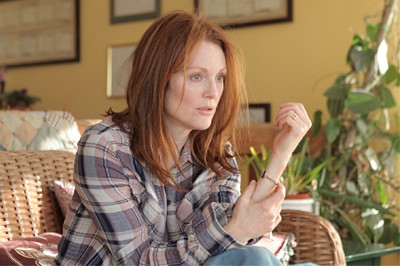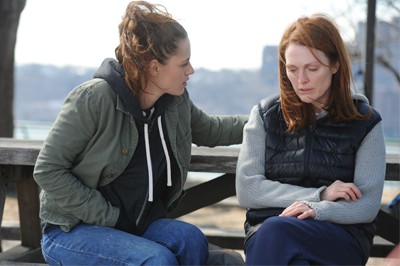| Reviews & Columns |
|
Reviews DVD TV on DVD Blu-ray 4K UHD International DVDs In Theaters Reviews by Studio Video Games Features Collector Series DVDs Easter Egg Database Interviews DVD Talk Radio Feature Articles Columns Anime Talk DVD Savant Horror DVDs The M.O.D. Squad Art House HD Talk Silent DVD
|
DVD Talk Forum |
|
|
| Resources |
|
DVD Price Search Customer Service #'s RCE Info Links |
|
Columns
|
|
|
Still Alice [AFI Fest 2014]
Sony Pictures // PG-13 // December 5, 2014
List Price: Unknown [Buy now and save at Fandango]

The ability to incite true emotion is a lot more difficult than most filmmakers imagine. That's why there's such an abundance of insincere dramatic filmmaking that continues to haunt our cinemas and television sets. Just when they think that they're drawing tears from viewers, they're actually encouraging "eye rolling" and sighs. Some believe that great performances by well-known faces can save a generic screenplay, but that proves to be massively ineffective. Writer/directors Richard Glatzer and Wash Westmoreland's Still Alice is an adaptation of Lisa Genova's novel, but it doesn't prove to be as impactful as many claimed the book to be. Even with all of the hype created after its premiere at Toronto International Film Festival, this proves to be an unconvincing disappointment.
Alice Howland (Julianne Moore) is happily married to Dr. John Howland (Alec Baldwin) with three grown children. She has a massively successful career as a renowned linguistics professor, who has taught around the world. She finds herself beginning to forget words, and so she seeks answers to where this may be rooted. The strength of the family's bonds will be tested by a devastating diagnosis of early-onset Alzheimer's disease. This is the story of a family's fight to support Alice through this difficult time, as she continues to lose more of her memory.
It doesn't take very long for Glatzer and Westmoreland to begin hinting at the development of this disease. When the fifty-year-old provides a lecture, she has difficulty finding some of the words to describe what she is trying to say. While she blames it on her anxiety, this proves to be one of the first examples of this disease beginning to affect her. Still Alice primarily spends the first act displaying the current state of her relationships with her family. Anna (Kate Bosworth) is her oldest child, who clearly is the most responsible out of the three. Other than some more subtle characterizations, Tom (Hunter Parrish) doesn't seem to be as reliable. However, the film spends quite a bit of time displaying the evolving relationship with daughter Lydia (Kristen Stewart), who wishes to pursue an acting career in theatre. Alice doesn't approve of this inconsistent profession, as she continues to attempt to convince Lydia to go to college. Meanwhile, her husband is constantly busy with work, and doesn't pay very much attention to any of the family relationships. The only genuine relationship here is the development of the one between Alice and Lydia. The remainder of them feel so incredibly forced. It's clear that the screenplay is trying to display a sympathetic family, but it fails to convince us of their emotions.
Signs of the illness continue to appear in a more visible fashion, as she forgets where she is while jogging around the university where she teaches. Another example is forgetting the bread pudding recipe that she used to always make for her family, and needing to look it up on her smartphone. Once she discovers that she has early-onset Alzheimer's disease, which could quite possibly be passed along to some of her children, she must inform her children of it. The dialogue turns what could have been a heart-breaking scene into an overly-dramatic representation that simply doesn't work. The overall reaction to the disease feels so incredibly fake. Still Alice falls in line with nearly every cliché that one could imagine, with walks on the beach to music, and all. Fortunately, the film has a couple elements that work rather well. It holds the motif of butterflies, as represented by her necklace. She compares herself to one, describing them as having a short, but a great life. Yet, this manages to be utilized in a smarter way, as it's handled in a much more subtle nature.
If subtlety is what made the picture's motif successful, then that would explain why the large majority of the feature feels so artificial. Still Alice constantly feels the need to force every emotion upon us. Instead of allowing the tears to flow naturally, it does all that it can in order to receive emotions that were never deserved in the first place. In what is supposed to be the most genuine scene of the film where Alice is giving a speech of what it means to her to have this disease, we're shown the reactions of the audience more than the individual actually giving the speech. If Glatzer and Westmoreland focused on Alice in this monumental moment, then this could have been a much more impactful scene. This is a major issue that hinders a large majority of the film, although the picture does have its moments of sincerity. One of which features Lydia asking Alice how she's doing, and what it feels like to know what is going to happen to all of her memories. She provides a genuine description without dramatic music overlapping it, which allows us to actually feel for the characters and their situation. It's just a shame that the remainder of the film couldn't have utilized similar tactics.
The screenplay is clearly what causes the majority of the film's issues, but the acting is what provides the feature with its strongest asset. Julianne Moore is absolutely mesmerizing in the role of Alice. Even when the dialogue becomes utterly ridiculous, this is a performance that brings everything together in a completely inspired fashion. It gives us the reason why we're watching this in the first place. Kristen Stewart once again proves that she can actually act in her post-Twilight portion of her career as Lydia. She displays a wide range of emotion that makes us believe in this mother-daughter relationship, which can surely be considered the picture's most genuine connection made between family members. The remainder of the supporting roles work, as well. Even though I'm not much of a fan of either Alec Baldwin or Kate Bosworth, they manage to be believable enough as Dr. John Howland and Anna, respectively. In particular, Moore and Stewart are saving graces for Still Alice.
Writer/directors Richard Glatzer and Wash Westmoreland haven't had much experience in this style of filmmaking, especially since Westmoreland was primarily known for his adult films in the past. Still Alice doesn't do much to hide the fact that these directors aren't very experienced in the craft of capturing drama in an interesting light. Rather, it employs an insanely generic sense of cinematography that simply doesn't pull us in. However, it does occasionally work in the direction that it should have gone in for the remainder of the running time. Instead, we're treated to an incredibly inconsistent visual style. As Alice progressively loses her memory, the world around her is out of focus, although she remains in focus. This allows us to see the world from her perspective, as we're left disoriented. If only similar methods were utilized throughout, the visual style could have been a lot more impressive.
Given that I haven't read the source material, i don't know the original direction that this was taken in. The story itself has the possibility to be a massively impactful one that could have reduced us to tears. Unfortunately, this feels like something that belongs on Lifetime TV. It desperately tries to make you feel emotions that haven't been earned. The film occasionally treats us to a moment of sincerity, but it's short-lived. The feature's saving graces are the performances. Julianne Moore is transfixing and Kristen Stewart is excellent in this honest portrayal. Unfortunately, they still aren't quite enough to entirely save this poor screenplay that just doesn't execute its material very well. Interestingly enough, this is all brought to you by the proud sponsor, Pinkberry. Still Alice is a contrived mess of fake emotion. Rent it.
Still Alice played at AFI FEST 2014 presented by Audi on November 12 and November 13.

|
| Popular Reviews |
| Sponsored Links |
|
|
| Sponsored Links |
|
|
| Release List | Reviews | Shop | Newsletter | Forum | DVD Giveaways | Blu-Ray | Advertise |
|
Copyright 2024 DVDTalk.com All Rights Reserved. Legal Info, Privacy Policy, Terms of Use,
Manage Preferences,
Your Privacy Choices | |||||||











